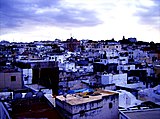
Tangier is a city in northwestern Morocco. It is on the Moroccan coast at the western entrance to the Strait of Gibraltar, where the Mediterranean Sea meets the Atlantic Ocean off Cape Spartel. The town is the capital of the Tanger-Tetouan-Al Hoceima region, as well as the Ṭanja-Aẓila Prefecture of Morocco.

The French protectorate in Morocco, also known as French Morocco, was the period of French colonial rule in Morocco between 1912 and 1956. The protectorate was officially established 30 March 1912, when Sultan Abd al-Hafid signed the Treaty of Fez, though the French military occupation of Morocco had begun with the invasion of Oujda and the bombardment of Casablanca in 1907.

The Spanish protectorate in Morocco was established on 27 November 1912 by a treaty between France and Spain that converted the Spanish sphere of influence in Morocco into a formal protectorate.

The British post offices in Morocco, also known as the "Morocco Agencies", were a system of post offices operated by Gibraltar and later the United Kingdom in Morocco.
Mohamed Choukri (15 July 1935 – 15 November 2003, was a Moroccan author and novelist who is best known for his internationally acclaimed autobiography For Bread Alone, which was described by the American playwright Tennessee Williams as "A true document of human desperation, shattering in its impact".
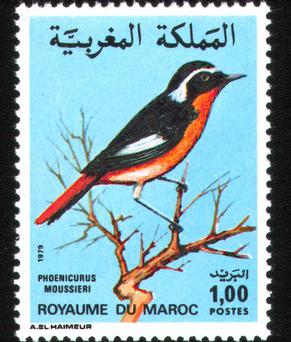
The postal history of Morocco is complex due to the country's political development in the 20th century. Mail was sent via post offices operated by the Sherifian post created by the Sultan, and by the European powers. After Morocco was partitioned into protectorates of France and of Spain in 1912, both European administrations established postal services in their respective zones.

Construction of the Anglo-Moroccan School (AMS) in Tangier, Morocco was completed in August 2008.
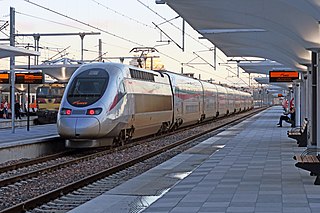
Al Boraq is a 323-kilometre-long (201 mi) high-speed rail service between Casablanca and Tangier, operated by ONCF in Morocco. The first of its kind on the African continent, the high-speed service was inaugurated on 15 November 2018 by King Mohammed VI of Morocco, following over a decade of planning and construction by Moroccan national railway company ONCF. It is the first phase of a planned 1,500 kilometres (932 mi) high-speed rail network in Morocco. Al Boraq trains operate over a dedicated high speed line, reaching speeds of up to 320 km/h (200 mph) on the 186 km (116 mi) sector between Tangier and Kenitra. From Kenitra, trains operate over an upgraded mainline for the final 137 km (85 mi) through Morocco’s most populous corridor, passing through Rabat to Casablanca.
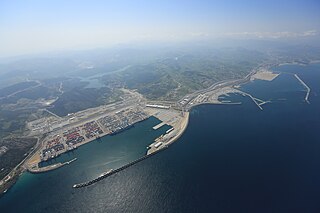
Tanger Med is a Moroccan industrial port complex, located 45 km northeast of Tanger and opposite of Tarifa, Spain on the Strait of Gibraltar, with handling capacities of 9 million containers, one of the largest industrial ports in the world, and the largest port in Africa. 7 million passengers, 700,000 trucks and the export of 1 million vehicles.

Tourism in Morocco is well developed, maintaining a strong tourist industry focused on the country's coast, culture, and history. The Moroccan government created a Ministry of Tourism in 1985. Tourism is considered one of the main foreign exchange sources in Morocco and since 2013 it had the highest number of arrivals out of the countries in Africa. In 2018, 12.3 million tourists were reported to have visited Morocco.

Tangier's economy is the third biggest of all Moroccan cities, after the economic capital Casablanca and the city of Fez. Tangier is Morocco's second most important industrial center after Casablanca. The industrial sectors are diversified: textile, chemical, mechanical, metallurgical and naval. Currently, the city has four industrial parks of which two have the status of free economic zone.

The Tangier International Zone was a 382 km2 (147 sq mi) international zone centered on the city of Tangier, Morocco, which existed from 1925 until its reintegration into independent Morocco in 1956, with interruption during the Spanish occupation of Tangier (1940–1945), and special economic status extended until early 1960. Surrounded on the land side by the Spanish protectorate in Morocco, it was governed under a unique and complex system that involved various European nations, the United States, and the Sultan of Morocco, himself under a French protectorate.
The following is a timeline of the history of the city of Tangier, Morocco.
American School of Tangier is an American international school in Tangier, Morocco, serving preschool through grade 12. In Morocco it is considered a non-profit organization, and AST is incorporated in the U.S. state of Delaware as a 501(c)(3) nonprofit. The American School of Tangier is accredited by the Middle States Association of Colleges and Schools.
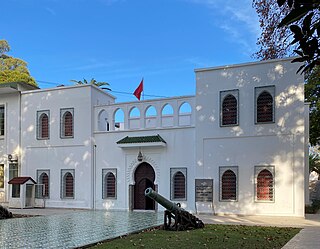
The Tangier Speech was a momentous speech appealing for the independence and territorial unity of Morocco, delivered by Sultan Muhammad V of Morocco on April 9, 1947 at the Mendoubia in what was then the Tangier International Zone, complemented by a second speech the next day at the Grand Mosque of Tangier. At the time, Morocco was under French and Spanish colonial rule, with Tangier designated as an international zone.
The Revolution of the King and the People was a Moroccan anti-colonial national liberation movement to end the French Protectorate and break free from the French colonial empire. The name refers to coordination between the Moroccan monarch Sultan Muhammad V and the popular Moroccan Nationalist Movement in efforts against colonialism and toward independence, particularly after the French authorities forced Sultan Muhammad V into exile on August 20, 1953—Eid al-Adha. August 20 is observed as a national holiday in Morocco in remembrance of the Revolution of the King and the People.

The Mendoubia or Mandubiyya refers to the former ceremonial mansion of the Mendoub, the representative of the Sultan of Morocco in the Tangier International Zone from 1924 to 1956. It now houses the commercial court of Tangier and a memorial museum.

The Moroccan Debt Administration, formally known as the Contrôle de la dette from 1904 to 1910 and after that as the Administration du Contrôle de la dette publique mahghzénienne, was an entity set up by the French government in 1904 to administer the sovereign debt of the Moroccan Monarchy.

The Marshan Palace is a palace of the King of Morocco in the Marshan neighborhood of Tangier, Morocco.

The Abdelhafid Palace or Moulay Hafid Palace is a historic structure at 23, rue Mohammed Ben Abedelouhab in the Hasnouna neighborhood of Tangier, Morocco. It was built in 1912–1913 as the intended main residence of former Sultan Abdelhafid following his abdication, but was never used for that purpose. In 1927, it was purchased by Italy and subsequently renamed Palazzo Littorio, hosting various public institutions including schools and a hospital. In 1943 the Badoglio government had it renamed Casa d'Italia, and a few years later it became known as the Palace of the italian Institutions. Even though it still houses various Italian-related activities and was renovated in the early 2000s, it has long remained underutilized.


